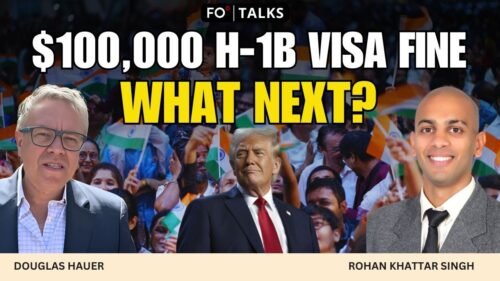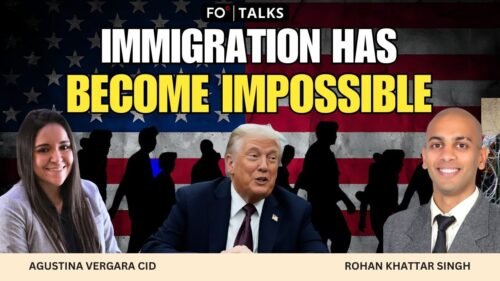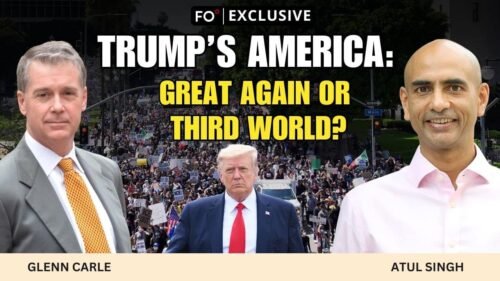Fair Observer’s Video Producer Rohan Khattar Singh speaks with Douglas Hauer, a former partner at Mintz and a lawyer with nearly three decades of experience, about the sudden Immigration and Customs Enforcement (ICE) raid at the Hyundai Motor Company’s Georgia plant. Hauer calls the event a watershed moment for US immigration enforcement. In his view, it marked a shift from deliberate coordination with corporate actors toward abrupt and highly visible action.
The raid, he explains, shows that US President Donald Trump’s administration “will not necessarily plan around trying to understand business considerations of a company [...] before just launching into an enforcement action.” Such operations traditionally follow extensive fact-finding to avoid errors affecting large, publicly traded companies. The Hyundai case, however, seemed to unfold with limited caution and unclear justification. As Hauer understands it, the trigger may have been irregularities in employment documentation.
What disturbed him most was the excessive use of restraint. Individuals were handcuffed despite no evidence that they posed physical threats. The optics of the raid — images of workers detained in cuffs — left Hauer questioning whether officials had properly assessed the risks. He characterizes the operation as an overreaction and a failure of deliberation that disregarded economic and human stakes.
South Korea launches a probe
The raid quickly took on international dimensions. Facing public outrage, the South Korean government launched an investigation into possible human rights violations against its citizens employed at the Hyundai facility. Khattar Singh notes that this move placed Washington in an uncomfortable diplomatic position.
Hauer believes the probe is likely an internal initiative by the South Korean capital of Seoul to reassure its domestic audience rather than an accusation aimed squarely at the United States. Though he does not want to overstate it as a major diplomatic rupture, he acknowledges that it forced US officials to act defensively. Reports indicated that the State Department and the Department of Homeland Security began coordinating to ensure that the immigration records of deported workers were cleared so they could return.
For both Hauer and Khattar Singh, this episode illustrates how labor enforcement in one state can spiral into a foreign policy headache. The US, long seen as a reliable investment destination, suddenly appeared unpredictable — particularly when global companies employ a transnational workforce with complex visa histories.
More raids coming?
The broader question, Khattar Singh asks, is whether the Hyundai operation signals more such actions ahead. Hauer is skeptical. He predicts that this situation won’t recur, reasoning that the government will likely exercise greater caution after the backlash. While acknowledging the administration’s willingness to take aggressive action, he does not foresee a pattern of raids targeting high-profile corporations.
Still, he cautions that the damage is not purely reputational. Foreign investors should take away lessons in proactive engagement. A company investing millions in US facilities must build early relationships with government stakeholders. Had Hyundai worked with the US Embassy in Seoul to establish streamlined visa pathways, the crisis could have been averted.
Hauer sees the incident as a failure of relationship management rather than evidence of hostility to foreign business. He describes the administration as simultaneously “friendly” to investment and “negligent” in enforcement. That duality of welcoming capital while mishandling compliance creates uncertainty. His advice to corporations is to be sharp, not scared: Hire experienced advisers, anticipate scrutiny and document the economic value they bring.
What should immigrants do?
The conversation concludes with practical guidance for immigrants. Hauer stresses that individuals on visas cannot assume stability in the current environment. He advises them to check in with their immigration attorneys every few months, likening it to a routine dental appointment. Rules can shift rapidly, and the US Department of State’s Foreign Affairs Manual, once a reliable guide for consular officials, has been largely eliminated.
For workers with pending applications or prior infractions, he warns that leniency is no longer guaranteed. Even minor lapses can now trigger severe consequences. Khattar Singh presses him on whether the raid reflects a political effort to energize anti-immigrant sentiment. Hauer rejects that interpretation outright. He maintains that the event was “one additional misstep” rather than a calculated message to the president’s political base.
Yet he acknowledges a deeper cultural problem: Anti-immigrant sentiment remains the “connective tissue” that binds extremes on both the right and left. It surfaces during moments of social tension and feeds on economic fear. The Hyundai raid, viewed in that light, is less a singular scandal than a symptom of a nation still struggling to balance enforcement, compassion and global credibility.
Hauer closes by recommending immigrants to stay informed, maintain clean records and seek professional advice early rather than wait for crises. Businesses, meanwhile, must understand that the US remains open for investment — but no longer offers the predictability it once promised.
[Lee Thompson-Kolar edited this piece.]
The views expressed in this article/video are the author’s own and do not necessarily reflect Fair Observer’s editorial policy.











































Comment